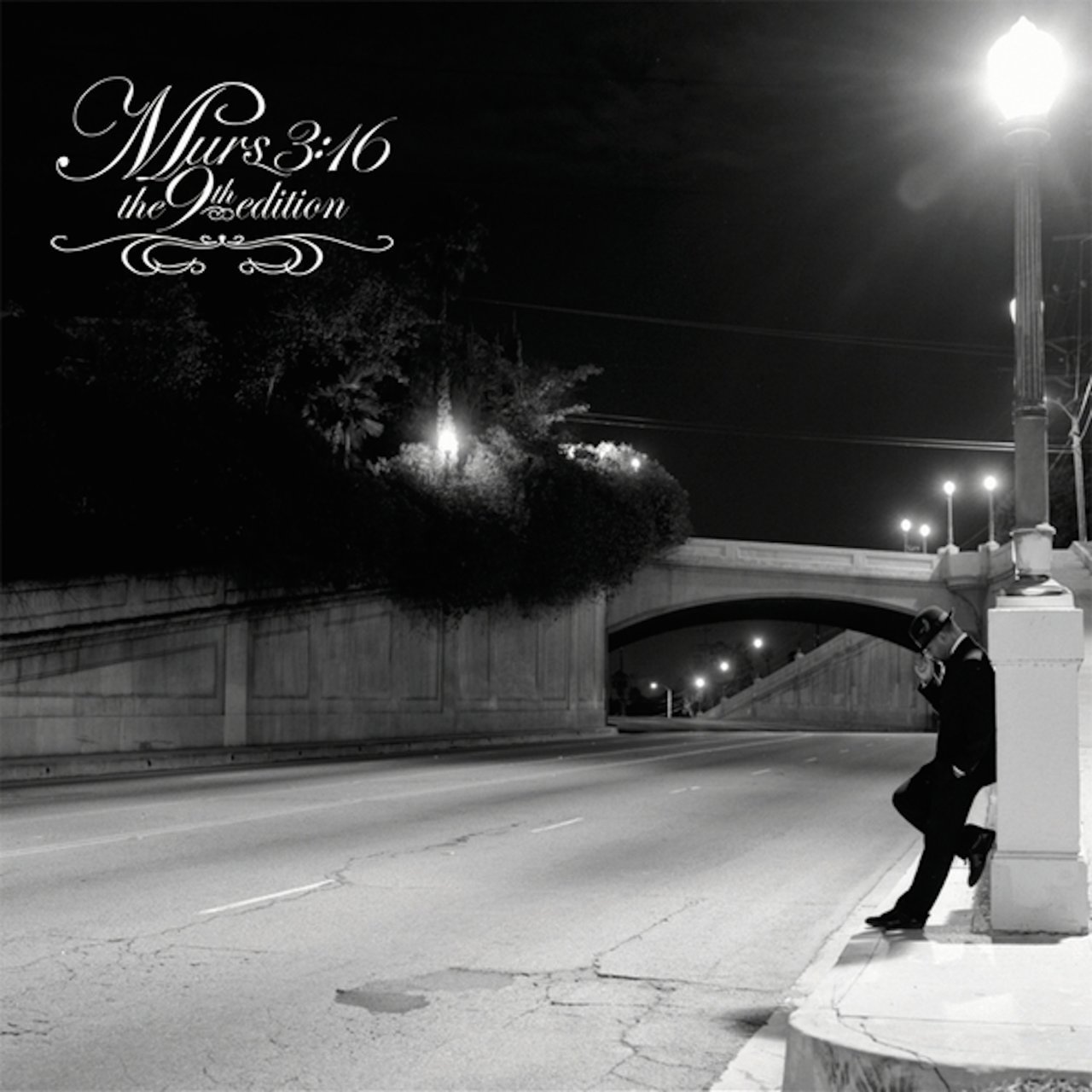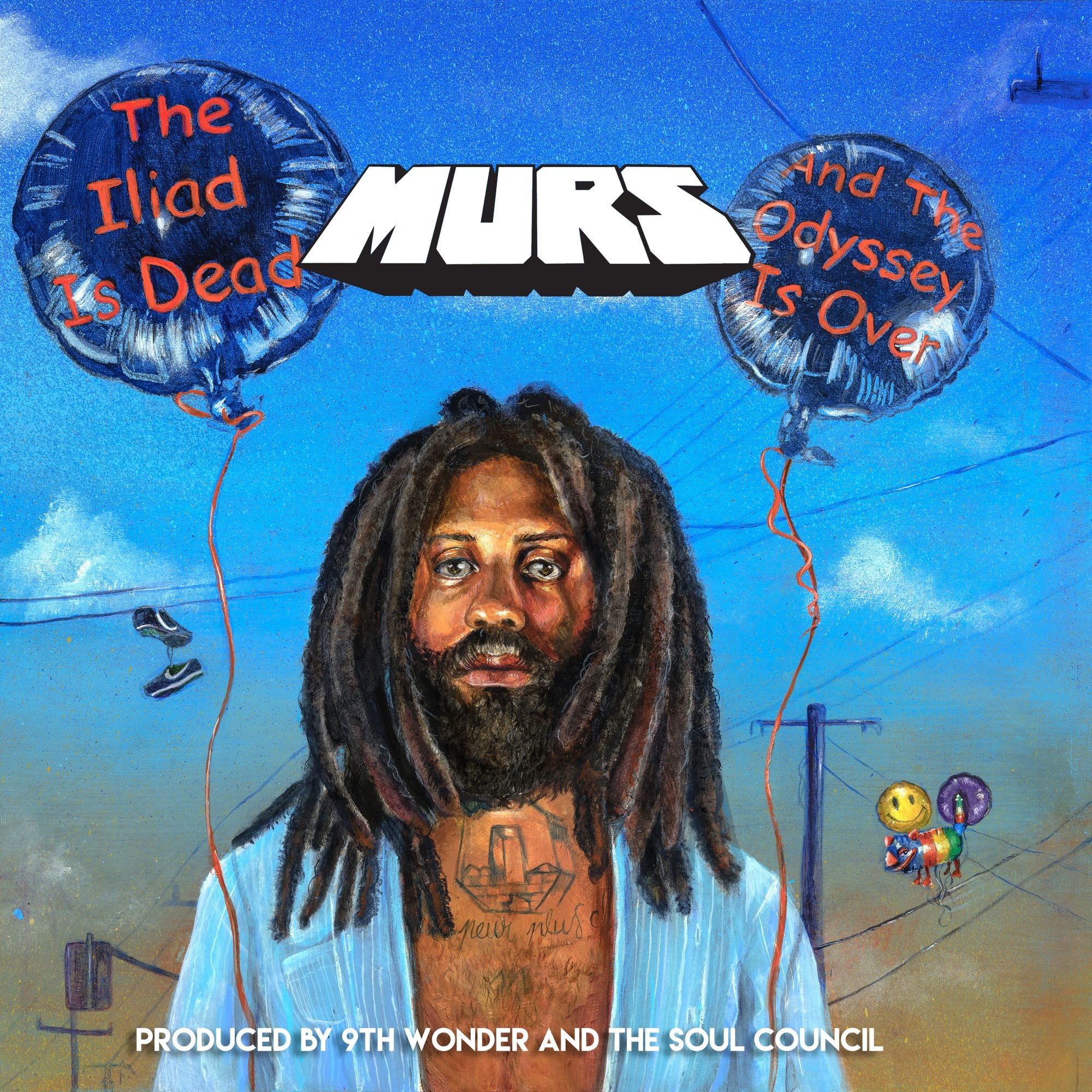Happy 20th Anniversary to MURS’ The End of the Beginning, originally released February 25, 2003.
The End of the Beginning may have been some people’s introduction to Nicholas “MURS” Carter, but the man already had a positively prolific career by the time his beginning ended. The Mid-City Los Angeles native had earned his stripes when The End of the Beginning was released 20 years ago, as it was by no means his first rodeo.
Before MURS signed to rapper/producer El-P’s Definitive Jux Records, he’d already released a few EPs and three solo albums, including one double album. He was also a member of the Living Legends crew, a pioneering collective of independent emcees primarily based in Northern California, but hailing from throughout the Golden State. By the time End of the Beginning hit the shelves, the Living Legends had already released a pair of albums through their own hustle, and MURS had extensively toured the world with his compatriots.
Within the California underground, MURS first made his name using freestyle and battling skills. MURS is technically an acronym for both “Making U Recognize and Submit” and “Making Underground Raw Shit.” As these monikers suggest, MURS was known in many circles for being nasty off the head, and could easily shred his competition in any setting. But as the years went on, he became a strong, multi-faceted emcee and performer. Clocking in at 70 minutes, The End of the Beginning album demonstrates his versatility as an artist and highlights the true breadth and depth of his skill.
MURS begins the album with “You & I,” where he addresses coming to grips with the new chapter in his career. Though he’s happy to have a larger budget and more reliable distribution, he raps that he’s still uncomfortable dealing with the traditional trappings of the music industry, longing for the simpler times. “Now I’m content with the mastery of words,” he raps. “Realize the importance is just being heard / By fans who love you and you love them / And honestly it’s love that moves this pen.”
End of the Beginning displays MURS’ storytelling ability. He’s excellent at setting scenes, often specialized to the environs of Southern California, and adding in the minute details and thoughts that make the experience feel genuine. Furthermore, the influence of rappers like Ice Cube are apparent in his rhymes, in that he can take a topic, such as gang violence, and provide three separate spins on it within one song.
For example on “The Night Before,” MURS describes a trio of nights when facing death was a real possibility. He describes surviving encounters with overzealous police officers, rival neighborhood gangs, and even potential friendly fire. Each 16-bar short story he presents feels authentic and lived-in.
He approaches “Please Leave” in a similar manner, where he describes trying to shed an unwanted romantic partner and then an unwanted long-term houseguest, telling them both to “Get the Fuck Out!” The last verse is dedicated to an unnamed rapper that he used to idolize that’s now become stuck in a rut of wackness. He creates an on-point description of the thoughts and sentiments that go along with watching one of your favorite artists become a shadow of themselves. “So I pushed it to the back of my mind, and hoped in time,” he raps. “Those fine memories would once again shine / But he just won't stop, even though his album flop / Every time I turn around his new one’s about to drop.”
Listen to the Album:
The funky “God’s Work” is a two-pronged description of the frustration that goes along with working hard in order to survive. On the first verse, MURS chronicles the struggle that goes along with commuting to an unfulfilling, dead-end job that you need to maintain in order to pay rent and put food on the table. With the second verse, MURS illustrates the daily grind of a month-and-a-half tour across the country. He learns to deal with each of his crew members’ idiosyncrasies, and how to survive inner-group squabbles and tensions that arise. He also relates the circumstances that lead to artists cheating on their significant others on the road, “not because I hate my girl, because I miss her.”
MURS covers subject matter that very few other emcees have tackled in an interesting manner. There aren’t many tracks like “Transitionz Az a Ridah,” his ode to skateboarding, “one of the few sports in life that promotes independence.” The beat, produced by Patchwerk, prominently features a shimmering sitar and incorporates the sounds of skateboard wheels rolling across the asphalt. MURS notes that “heaven is a half pipe” and describes the “spiritual bliss” that comes with successfully landing a trick. He makes sure to shout out 15-stair nose slides and bert slides, and gives a “rest in peace shout outs” to spots across the country that no longer welcome skaters.
Another of MURS’ strengths is the way that he incorporates his quirky sense of humor in his songs. It’s apparent on tracks like “BT$” a.k.a. “Big Time $pender” a.k.a. “Buy That $hit,” where he details blowing through reams of cash whenever he gets his hands on it. Whether it’s over $200 on Star Wars Episode 2 action figures or bootleg videos from the Slauson swap meet, he freely admits that the money “comes slow and goes fast.”
The ribald “Risky Business” is his team-up with Digital Underground’s Shock G & alter ego Humpty Hump a.k.a. “the only fool dumb enough to fail his P.E. class.” The track is loosely based on the Tom Cruise movie of the same name: MURS is home alone while his parents are out of town, only to find his home occupied by Shock and Humpty, with the latter leaving a path of destruction in his wake. On one hand, Humpty steals and crashes MURS’ father’s Rolls Royce and dumps the barbecue pit in the pool. On the other hand, he brings the employees of the local strip club back to the house with him.
“Happy Pillz” is blissfully dazed duet with fellow Def Jukie Aesop Rock, dedicated to both of their reliance on ingestible medication to make it through the day. Aesop and MURS tackle their verses creatively: first Aesop kicks an 8-bar verse in his trademark abstract, off-kilter style, followed by MURS re-adapting the content, adding his own unique style and panache. The Blockhead-produced beat is a sleazy concoction, punctuated by slightly-off pianos, bass, and guitar, which, in the words of Aesop, “sounds like the theme song to the Houston 500 Marathon Fuck-Fest.”
“Def Cover” is a remake of Dr. Dre and Snoop Doggy Dogg’s “Deep Cover.” El-P creates a bassline roughly reminiscent of the original track, infusing it with his brand of dystopic funk, complete with pulsating keys along with buzzing bells and chimes. Meanwhile, MURS takes Dre and Snoop’s general flow of the lyrics and transforms them from a tale creeping through the ’hood into a three-verse braggadocio hymn. “I’m making kids wanna grow up to be astronauts again,” he raps. ”’Cause they see being an emcee is not an option when / There’s a hungry motherfucker like me looking for fresh meat / To make ’em look foolish as hell over their best beat.”
Enjoying this article? Click/tap on the album covers to explore more about MURS:
All of the battle-rap oriented tracks on The End of the Beginning similarly skew to the weirder side of what the album has to offer. “The Dance” features MURS utilizing a double-time flow over a spacey synch-heavy track also produced by El-P, who contributes a verse as well. “Sore Losers” is MURS’ most adrenaline-packed performance, as he aggressively attacks his opponents, barely controlling his fury. The RJD2-produced, fuzzy, feedback-ridden beat sounds like the soundtrack of arcade game Galaga drenched in LSD.
MURS draws End of the Beginning to a close on a more emotional note. He addresses his love for his younger sibling on “Brotherly Love,” revealing how proud of him he’s become while observing him grow and mature. With his second verse, he admonishes young men still trapped in gang life, pleading with them to value the lives of others as well as themselves.
“Done Deal” serves as a solid bookend to the album, as he teams up with Eligh and Scarub, the other members of 3 Melancholy Gypsies (as well as members of Living Legends), one of the earliest groups that he was involved with as a teenager. MURS describes the lessons that he’s learned throughout his career, rapping, “N***as want all the dough, but never learn to bake / So they rise too fast and they burn the plate / But I’m concerned with fate, and watch the turns I take / Know this world is affected by the moves you make.”
In the two decades since MURS ended his beginning, he’s become an extremely prolific artist, releasing a couple dozen projects. He signed to Warner Bros. for a time, and later to Tech 9ne’s Strange Music imprint. Meanwhile, he also built strong bodies of work through separate partnerships with producer 9th Wonder and underground hero Slug of Atmosphere. And there’s another dozen or so projects and partnerships that I’m leaving out. MURS is a true success story, and one of the few emcees out there who’s came close to leaving it all out there throughout his career.
With The End of the Beginning, MURS further built upon what he had already created during the late ’90s and early ’00s and demonstrated that he was an emcee that could do just about everything well. Twenty years later, his personality and records maintain their unique edge, with The End the Beginning executing his roadmap to success. The end of MURS’ beginning turned out to be anything but the beginning of his end.
LISTEN:
Editor's note: this anniversary tribute was originally published in 2018 and has since been edited for accuracy and timeliness.



